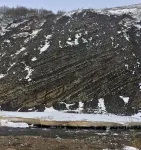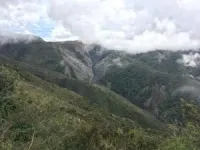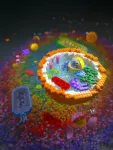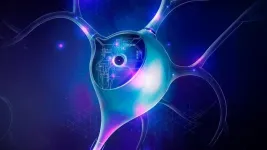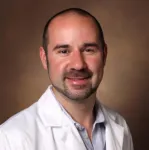(Press-News.org) Main points:
New research has overturned the traditional view that natural rock weathering acts as a CO2 sink that removes CO2 from the atmosphere. Instead, this can also act as a large CO2 source, rivalling that of volcanoes.
The results have important implications for modelling climate change scenarios but at the moment, CO2 release from rock weathering is not captured in climate modelling.
Future work will focus on whether human activities may be increasing CO2 release from rock weathering, and how this could be managed.
A new study led by the University of Oxford has overturned the view that natural rock weathering acts as a CO2 sink, indicating instead that this can also act as a large CO2 source, rivalling that of volcanoes. The results, published today in the journal Nature, have important implications for modelling climate change scenarios.
Rocks contain an enormous store of carbon in the ancient remains of plants and animals that lived millions of years ago. This means that the “geological carbon cycle” acts as a thermostat that helps to regulate the Earth’s temperature. For instance, during chemical weathering rocks can suck up CO2 when certain minerals are attacked by the weak acid found in rainwater. This process helps to counteract the continuous CO2 released by volcanoes around the world, and forms part of Earth’s natural carbon cycle that has helped keep the surface habitable to life for a billion years or more.
However, for the first time this new study measured an additional natural process of CO2 release from rocks to the atmosphere, finding that it is as significant as the CO2 released from volcanoes around the world. Currently, this process is not included in most models of the natural carbon cycle.
The process occurs when rocks that formed on ancient seafloors (where plants and animals were buried in sediments) are pushed back up to Earth’s surface, for example when mountains like the Himalayas or Andes form. This exposes the organic carbon in the rocks to oxygen in the air and water, which can react and release CO2. This means that weathering rocks could be a source of CO2, rather than the commonly assumed sink.
Up to now, measuring the release of this CO2 from weathering organic carbon in rocks has proved difficult. In the new study, the researchers used a tracer element (rhenium) which is released into water when rock organic carbon reacts with oxygen. Sampling river water to measure rhenium levels makes it possible to quantify CO2 release. However, sampling all river water in the world to get a global estimate would be a significant challenge.
To upscale over Earth’s surface, the researchers did two things. First, they worked out how much organic carbon is present in rocks near the surface. Second, they worked out where these were being exposed most rapidly, by erosion in steep, mountain locations.
Dr Jesse Zondervan, the researcher who led the study at the Department of Earth Sciences, University of Oxford, said: “The challenge was then how to combine these global maps with the river data, while considering uncertainties. We fed all of our data into a supercomputer at Oxford, simulating the complex interplay of physical, chemical, and hydrological processes. By piecing together this vast planetary jigsaw, we could finally estimate the total carbon dioxide emitted as these rocks weather and exhale their ancient carbon into the air."
This could then be compared to how much CO2 could be drawn down by natural rock weathering of silicate minerals. The results identified many large areas where weathering was a CO2 source, challenging the current view about how weathering impacts the carbon cycle. Hotspots of CO2 release were concentrated in mountain ranges with high uplift rates that cause sedimentary rocks to be exposed, such as the eastern Himalayas, the Rocky Mountains, and the Andes. The global CO2 release from rock organic carbon weathering was found to be 68 megatons of carbon per year.
Professor Robert Hilton (Department of Earth Sciences, University of Oxford), who leads the ROC-CO2 research project that funded the study, said: “This is about 100 times less than present day human CO2 emissions by burning fossil fuels, but it is similar to how much CO2 is released by volcanoes around the world, meaning it is a key player in Earth’s natural carbon cycle”.
These fluxes could have changed during Earth’s past. For instance, during periods of mountain building that bring up many rocks containing organic matter, the CO2 release may have been higher, influencing global climate in the past.
Ongoing and future work is looking into how changes in erosion due to human activities, alongside the increased warming of rocks due to anthropogenic climate changes, could increase this natural carbon leak. A question the team are now asking is if this natural CO2 release will increase over the coming century. “Currently we don’t know – our methods allow us to provide a robust global estimate, but not yet assess how it could change’’ says Hilton.
“While the carbon dioxide release from rock weathering is small compared to present-day human emissions, the improved understanding of these natural fluxes will help us better predict our carbon budget” concluded Dr. Zondervan.
Notes to editors:
Media contact – Professor Robert Hilton, robert.hilton@earth.ox.ac.uk
The study ‘Rock organic carbon oxidation CO2 release offsets silicate weathering sink’ will be published in Nature at 16:00 BST/ 11:00 ET on Wednesday 04 October 2023 at https://doi.org/10.1038/s41586-023-06581-9
To view a copy of the paper before this under embargo, contact Dr Caroline Wood: caroline.wood@admin.ox.ac.uk
About the University of Oxford
Oxford University has been placed number 1 in the Times Higher Education World University Rankings for the eighth year running, and number 3 in the QS World Rankings 2024. At the heart of this success are the twin-pillars of our ground-breaking research and innovation and our distinctive educational offer.
Oxford is world-famous for research and teaching excellence and home to some of the most talented people from across the globe. Our work helps the lives of millions, solving real-world problems through a huge network of partnerships and collaborations. The breadth and interdisciplinary nature of our research alongside our personalised approach to teaching sparks imaginative and inventive insights and solutions.
Through its research commercialisation arm, Oxford University Innovation, Oxford is the highest university patent filer in the UK and is ranked first in the UK for university spinouts, having created more than 300 new companies since 1988. Over a third of these companies have been created in the past five years. The university is a catalyst for prosperity in Oxfordshire and the United Kingdom, contributing £15.7 billion to the UK economy in 2018/19, and supports more than 28,000 full time jobs.
END
New research finds that ancient carbon in rocks releases as much carbon dioxide as the world's volcanoes
2023-10-04
ELSE PRESS RELEASES FROM THIS DATE:
New "Assembly Theory" unifies physics and biology to explain evolution and complexity
2023-10-04
An international team of researchers has developed a new theoretical framework that bridges physics and biology to provide a unified approach for understanding how complexity and evolution emerge in nature. This new work on "Assembly Theory," published today in Nature, represents a major advance in our fundamental comprehension of biological evolution and how it is governed by the physical laws of the universe.
This research builds on the team's previous work developing Assembly Theory as an empirically validated approach to life detection, ...
Unlocking the secrets of neuronal function: a universal workflow
2023-10-04
Biophysically detailed neuronal models provide a unique window into the workings of individual neurons. They enable researchers to manipulate neuronal properties systematically and reversibly, something that is often impossible in real-world experiments. These in silico models have played a pivotal role in advancing our understanding of how neuronal morphology influences excitability and how specific ion currents contribute to cell function. Additionally, they have been instrumental in building neuronal circuits to simulate and study brain activity, offering ...
Munich neuroscientist receives around 1.5 million euros for research into ALS and FTD
2023-10-04
Dr. Qihui Zhou, a neuroscientist at DZNE’s Munich site, has been awarded a “Starting Grant” from the European Research Council (ERC) worth about 1.5 million euros to investigate disease mechanisms of amyotrophic lateral sclerosis (ALS) and frontotemporal dementia (FTD). With her studies, which will focus on the role of immune cells in the disease process and on the most common genetic forms of ALS and FTD, Zhou aims to pave the way for better treatments.
ALS and FTD are devastating diseases characterized by loss of brain cells for which there ...
INSEAD launches world’s largest XR immersive learning library for management education and research
2023-10-04
First business school to launch comprehensive library of VR Learning Experiences to make management education more impactful and to advance management research
VR Learning Experiences already used by 40+ professors and 13K+ learners at INSEAD and now available globally via the INSEAD XR Portal
Professor Ithai Stern, Academic Director of the INSEAD Immersive Learning Initiative, wins 2023 Strategic Management Society Educational Impact Award for his contribution to quality and innovation of strategic management teaching
Fontainebleau ...
Largest dataset of thousands of proteins marks landmark step for research into human health
2023-10-04
Today, [Wednesday 4 October] the scientific journal Nature1 published the results of the world’s largest and most comprehensive study on the effects of common genetic variation on proteins circulating in the blood and how these associations can contribute to disease. This unprecedented population-scale investigation of proteins, powered by turning biological samples into data from UK Biobank, will help scientists better understand how and why diseases develop, which could help drive the development of new diagnostics and treatments for a wide range of health conditions.
To develop this unique and unparalleled dataset, researchers measured the abundance of nearly ...
Selective removal of aging cells opens new possibilities for treating age-related diseases
2023-10-04
A research team, led by Professor Ja Hyoung Ryu from the Department of Chemistry at UNIST, in collaboration with Professor Hyewon Chung from Konkuk University, has achieved a significant breakthrough in the treatment of age-related diseases. Their cutting-edge technology offers a promising new approach by selectively removing aging cells, without harming normal healthy cells. This groundbreaking development is poised to redefine the future of healthcare and usher in a new era of targeted therapeutic interventions.
Aging cells, known as senescent cells, contribute to various inflammatory conditions and age-related ailments as humans age. To address this issue, the research team focused on ...
CHOP researchers find barriers to driver training and licensure, especially among low-income teens
2023-10-04
Philadelphia, October 2, 2023 – Researchers from the Center for Injury Research and Prevention (CIRP) at Children’s Hospital of Philadelphia (CHOP) and the Stuart Weitzman School of Design at the University of Pennsylvania have found that teenagers living in lower-income areas of the Columbus, Ohio metro area are up to four times less likely to complete driver training and obtain their driver’s license before age 18. Long travel times to driving schools also impacted enrollment in driver education, affecting those from both higher- and lower-income areas.
The findings, originally published in the journals Accident Analysis and Prevention ...
Vulnerability found in immunotherapy-resistant triple-negative breast cancer
2023-10-04
Researchers at Vanderbilt-Ingram Cancer Center have discovered a druggable target on natural killer cells that could potentially trigger a therapeutic response in patients with immunotherapy-resistant, triple-negative breast cancer.
Currently, only about 15% of early-stage, triple-negative breast cancer patients benefit from combining immunotherapy, drugs that target immune cells to attack the tumor, with chemotherapy. Identifying why most patients don’t respond is critical for personalizing treatment plans and minimizing therapy ...
Discovery of massive undersea water reservoir could explain New Zealand’s mysterious slow earthquakes
2023-10-04
Researchers have discovered a sea’s worth of water locked within the sediment and rock of a lost volcanic plateau that’s now deep in the Earth’s crust. Revealed by a 3D seismic image, the water lies two miles under the ocean floor off the coast of New Zealand, where it may be dampening a major earthquake fault that faces the country’s North Island.
The fault is known for producing slow-motion earthquakes, called slow slip events. These can release pent-up tectonic pressure harmlessly over days and weeks. Scientists want to know why they happen more often at some ...
Should fathers be screened for postpartum depression?
2023-10-04
Dads can suffer from postpartum depression, and a new pilot study at the University of Illinois Chicago suggests they can and should be screened for the condition. Given the intertwined effects of mothers’ and fathers’ physical and mental health, addressing the health of fathers may be a powerful untapped tool in improving the nation’s ongoing maternal health crisis.
The researchers got mothers’ permission to interview and screen 24 dads, 30% of whom screened positive for postpartum depression on the same tool ...

